Plunging Value of 100 East Building Will Impact City Taxes
$30 million will be wiped from tax rolls. Plus: A recap of the week's real estate news.
The crashing occupancy rate, and proposed sale, of one of Milwaukee’s most valuable buildings could end up costing Milwaukee homeowners a couple of dollars per year.
The 100 East office tower, which has been in foreclosure since 2021, would be sold to a developer partnership for less than half of its assessed value. The buyers plan to redevelop the 35-story building as an apartment complex.
An affiliate of California-based Hertz purchased the property, 100 E. Wisconsin Ave., and a skywalk-connected parking structure for $78 million in 2016. Located along the river at the intersection of E. Wisconsin Ave. and N. Water St, it was one of the city’s 10 most valuable properties. But the building’s occupancy rate is now below 50%.
A partnership of the Klein family and Johnny Vassallo would pay $28.75 million for the properties, according to a document filed in the foreclosure case. And while the eventual plan calls for 350 apartments and a return to more prosperous times, the initial sale or a separate assessment lawsuit would erase at least $30 million in taxable value for the City of Milwaukee.
The tax impact for Milwaukee residents, while not significant, would come in future years once a lower assessed value is recognized. Based on a high-level estimate, the average homeowner could see their annual property tax bill increase by almost $4 because of the loss of assessed value for this one building.
The tower and parking structure are currently assessed for $64.3 million, and, if sold, would likely be reduced to the $28.75 million sale price, a $35.6 million reduction. The loss of value represents a reduction of approximately 0.1% of the city’s entire 2022 assessed value ($34.5 billion). Because property tax levies are effectively capped by state law, the remaining property owners would see their tax bill grow proportionally to fill the gap. The average Milwaukee home was assessed for $154,469 in 2022. Losing $35.6 million in assessed value would have the equivalent tax impact of 230 average homes disappearing.
A separate assessment lawsuit, filed in January, argues the mostly-vacant tower is already worth only $32.4 million and seeks a return of excess property taxes. Such a change would cut the property tax bill, for just the tower, from $1.4 million to approximately $770,000. For the past two years, the city has assessed the tower for $60.2 million and the parking structure, 718-722 N. Water St., for $4.1 million. The tower’s assessed value peaked at $75.4 million in 2011, and it was assessed at $73.7 million in 2020. The parking structure peaked at $4.99 million in 2018.
A successful redevelopment, as several industry sources expect, would see the building’s assessed value climb again and erase much of the tax impact to other Milwaukee property owners. But the current mortgage holder, a trust affiliated with J.P. Morgan Chase, would lose $22.1 million upon the sale based on the difference between the sale price and the March 2022 unpaid mortgage debt ($50.8 million). Should it prevail in its assessment lawsuit, the trust could recover more than $600,000 in returned property tax payments.
A hearing is scheduled for April 12 to review the sale, which is backed by the trust. The purchase could happen in May. The new buyers were one of eight purchasers that responded to CBRE‘s listing of the property and were selected from a pool of three final bidders.
A host of independent variables, including changes in values to other properties, differing borders for different taxing entities, the assessment ratio and the net value of any new construction, prevent the calculation of a specific figure on the tax impact. We used the $4 figure as a high-level estimate of the impact large property value swings have under the state-imposed assessment and tax system.
For more on the proposed 100 East redevelopment, see our coverage from earlier this month.
Photos
Weekly Recap
Marquette’s New Nursing Building Quickly Taking Shape
A new home for Marquette University‘s College of Nursing is quickly taking shape on the near west side campus.
The university is overhauling Straz Hall, formerly the home of its College of Business Administration, into a modern nursing education complex.
The five-story building, 1225 W. Wisconsin Ave., will gain a new front door and large atrium that faces Marquette’s pedestrian-only quad between Wisconsin Avenue and Clybourn Street. Interior spaces will include an auditorium, flexible classrooms and a newly-created, wraparound service center to support students. Labs will be interspersed throughout the building and a student break room will overlook the campus. Faculty and staff offices will be included on the upper floors.
Construction began at the very end of 2022 and is expected to be completed in 2024.
Pabst Mansion Wants To Deconstruct 1893 World’s Fair Addition
Milwaukee’s most famous house could soon lose a high-profile addition.
The Pabst Mansion would see the pavilion structure attached to its eastern facade deconstructed. The nonprofit museum operator hopes to eventually recreate the structure, but will seek Historic Preservation Commission approval to remove the terra-cotta-clad structure while saving an estimated 25% of its structural elements. The first step is conducting a 3D laser survey.
The 20,000-square-foot mansion was built as a home for Captain Frederick Pabst and his wife Maria in 1892 by Milwaukee architects Ferry & Clas. But the pavilion’s history can be traced back to a site 100 miles to the south in Chicago.
The pavilion was built as Pabst Brewing Company‘s booth at the 1893 World’s Columbian Exposition, a World’s Fair made famous in modern times by The Devil in the White City book. It’s one of only a handful of structures remaining from the White City, much of which was designed by Daniel Burnham as a temporary campus.
Free Home Repair Organization Receives $1 Million Grant
Revitalize Milwaukee is receiving $1 million to continue to serve people through its Emergency Repair Program.
The nonprofit organization helps communities by providing free, critical home repairs and comprehensive services to low-income veterans, seniors and people with disabilities.
It is the largest provider of free home repairs in southeastern Wisconsin and is continuing to add more services.
“If you knew us before the pandemic, you should probably check back in,” said Lynnea Katz-Petted, Revitalize Milwaukee CEO. “We added at least 10 new program areas over the last two years.”
Northwestern Mutual’s Glassy Second Tower Is A Go
Northwestern Mutual‘s $500 million plan to overhaul its aging 18-story North Building into a glassy tower and relocate its approximately 2,000 Franklin-based employees to downtown Milwaukee found unanimous support from the Common Council Tuesday, even though the city is contributing $30 million to the plan.
The city financial support, effectively a property tax rebate, will be stretched out over two decades. As part of creating the tax incremental financing (TIF) district, the city is also allocating $10 million in increased property tax revenue toward public improvements. The projects, which must be made within a half mile of the district’s boundaries, include new protected bike lanes, redesigning a major lakefront intersection and improving Cathedral Square Park and Juneau Park.
“Today’s approval kickstart the planning process as we look forward to a fall 2023 start to construction,” said company vice president Steve Radke in a statement. Company officials previously said the overhauled building could open in 2027.
The plan was spurred by Northwestern Mutual’s desire to address the aging building, built in 1990, and create a more collaborative work environment. The building, 818 E. Mason St., is to become a smaller version of its 32-story tower to the south. Designed by Pickard Chilton, the 2017 tower’s designer, the latest redevelopment would create a “consistent world-class experience no matter where you are on campus,” said Rebecca Villegas, vice president of enterprise compliance and the project leader, in February. The 540,000-square-foot tower would gain approximately 80,000 square feet of space as the building is stripped to its steel core and rebuilt with slightly expanded floor plates. The interior of each floor would see substantially more natural light with the glass facade. “Ultimately, it’s all about attracting talent.”
If you think stories like this are important, become a member of Urban Milwaukee and help support real, independent journalism. Plus you get some cool added benefits.
Plats and Parcels
-
New Third Ward Tower Will Be Milwaukee’s Priciest
 Mar 3rd, 2024 by Jeramey Jannene
Mar 3rd, 2024 by Jeramey Jannene
-
New Corporate Headquarters, 130 Jobs For Downtown
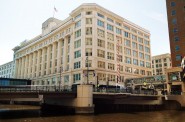 Feb 25th, 2024 by Jeramey Jannene
Feb 25th, 2024 by Jeramey Jannene
-
A Four-Way Preservation Fight Over Wisconsin Avenue
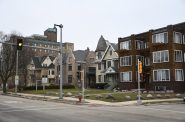 Feb 18th, 2024 by Jeramey Jannene
Feb 18th, 2024 by Jeramey Jannene


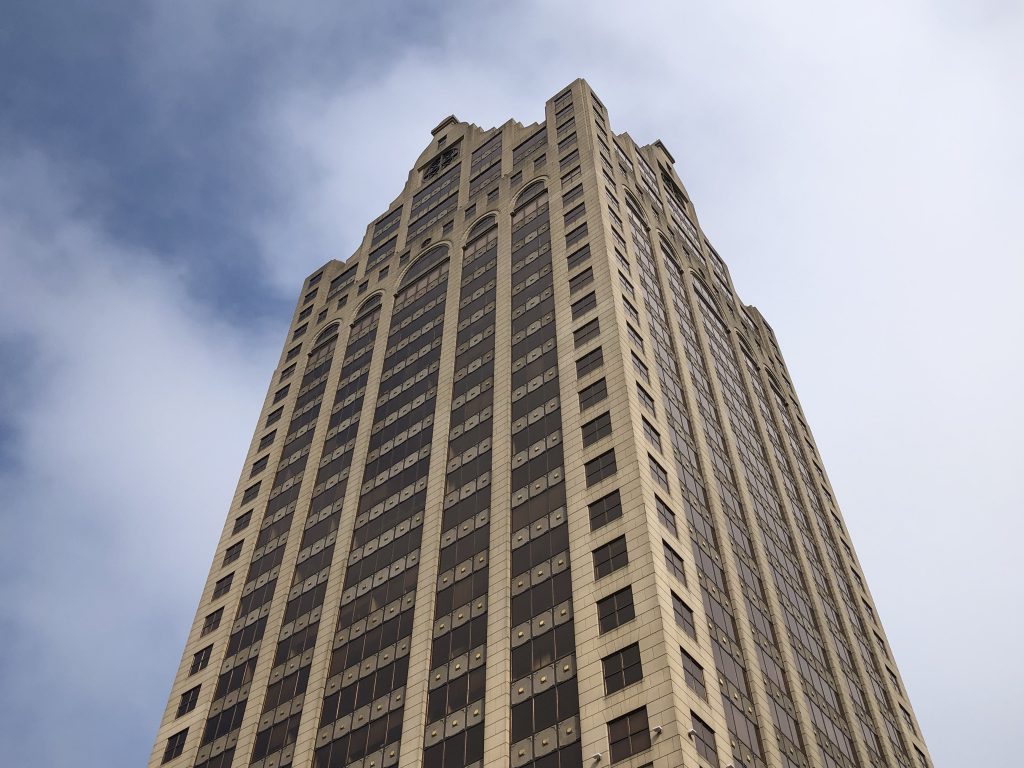
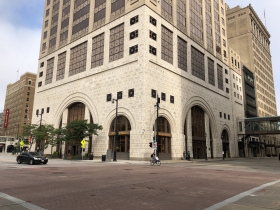
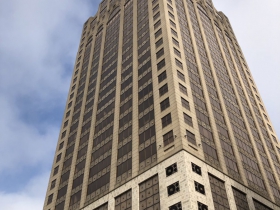
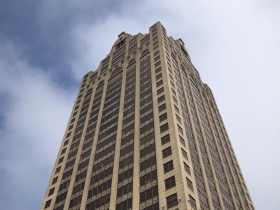




















Anyone remember where the Home Rule axe is?
Anyone remember how to sharpen it?
As for 100 E. Wisconsin’s assessment for tax purposes… if the eventual apartments are worth an average of $200,000 each (seems reasonable to me as this is a REALLY prime location), that’s $70 million right there (plus whatever the ground floor retail space is worth).